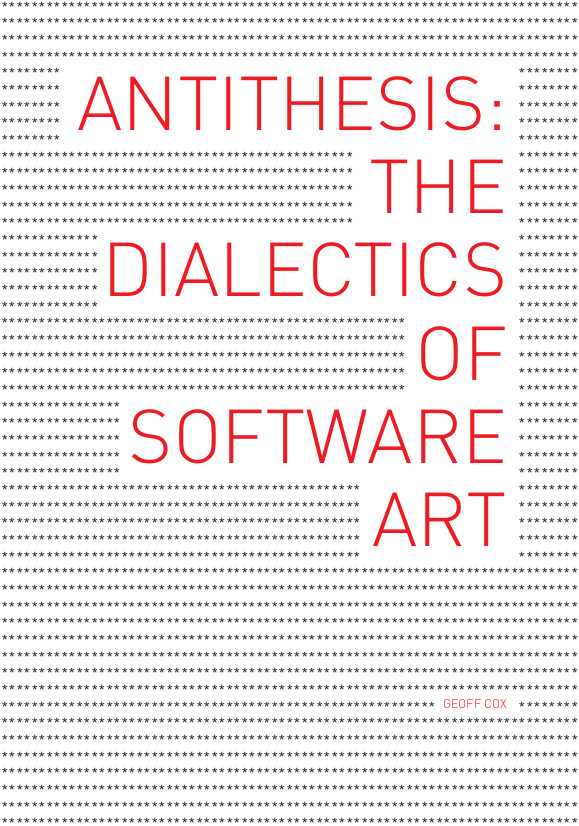Geoff Cox: Antithesis: The Dialectics of Software Art (2006/2010)
Filed under thesis | Tags: · code, software, software art

Software art refers to the production of software as art rather than the use of software to produce art. This thesis situates software arts practice in relation to a dialectical materialist tradition that focusses attention on the site of production and the contradictions within the relations of production. By making reference to post-Marxist theories, it is argued that antagonisms associated with traditional forms of labour have been extended to include the labour of machines and software. Therefore any analysis of the labour involved in making art must recognise the ways in which labour has become more immaterial, collective and communicative. In the case of software art, both the programmer and program can be seen to work, and produce artwork as software. Software art thereby holds the potential to make apparent the contradictions within the relations of production, as well as the potential to be programmed to act in a disruptive manner. That software art demonstrates emergent properties is substantiated by referring to both systems theory and dialectics, that share a common interest in dynamic processes and transformative agency.
Consequently, the term ‘software praxis’ is proposed to characterise the combination of creative and critical activity embodied in transformative action. It is the assertion of this thesis that software art praxis can offer new critical forms of arts practice by embodying contradictions in the interplay between code and action. Contradiction is also embodied in the form this PhD submission takes: it is both a thesis in itself and, like software, ready to express its dialectical potential once executed. This thesis takes the conventional form of academic writing and a program script written in Perl. It collapses form and content by presenting a thesis _about_ software art that is simultaneously an example _of_ software art. Both the text and the program script can be interpreted and acted upon.
The PhD submission includes references to a number of essays written during the registration period, and those that relate closely to the main argument are attached. Also included is documentation of three collaborative projects: the exhibition _Generator_, the publication _Notes Towards the Complete Works of Shakespeare_, and The UK Museum of Ordure’s _Audio Library_ installation. These projects are represented by print-outs of web pages and video documentation on DVD. Although referred to in the text, the projects do not illustrate the thesis but embody its argument. Similarly, the text is not a linked narrative to these projects but an example of software art practice in itself. In form and content, the thesis expresses a dialectics of software art.
A thesis submitted to the University of Plymouth in partial fulfilment for the degree of Doctor of Philosophy
School of Computing, Communications & Electronics, Faculty of Technology
March 2006
Published as a book by Digital Aesthetics Research Center, Aarhus University, Denmark, 2010
GNU Free Documentation License. Version 1.3
ISBN 8791810159, 9788791810152
232 pages
author (thesis)
author (book)
publisher
PDF (thesis, TXT)
PDF (book, PDF, added on 2012-10-13)
Domenico Quaranta (ed.): Ubermorgen.com (2009)
Filed under catalogue | Tags: · activism, hacktivism, media art, net art, software art

UBERMORGEN.COM is an artist duo created in Vienna, Austria, in 1999 by lizvlx and Hans Bernhard, a founder of etoy. Behind UBERMORGEN.COM we can find one of the most unmatchable identities – controversial and iconoclast – of what they call “the contemporary European techno-fine-art avant-garde”. Their open circuit of conceptual art, drawing, software art, pixelpainting, computer installations, net.art, sculpture and digital activism (media hacking) transforms their brand into a hybrid Gesamtkunstwerk.
This monograph is a first attempt to provide an overview of their hybrid body of work, that moves constantly between art and entertainment, mass communication and one-to-one experience, digital and physical; and to introduce their corporate identity, that is itself a work of art. Through projects such as [V]ote Auction, Psych|OS, Art Fid, Superenhanced and the recent monument to the e-commerce age known as The EKMRZ Trilogy, and trough contributions by the art critics Inke Arns and Domenico Quaranta and the legendary net.art duo Jodi.org, this book is also a veritable portrait of a future that is already here.
Edited by Domenico Quaranta
Texts by Domenico Quaranta, Inke Arns, Jodi.org
Published by FPEditions, Brescia, February 2009
160 x 225 mm / 6.3 x 8.9 in
ISBN: 978-88-903308-5-8
96 pages
Adrian Mackenzie: Cutting Code: Software and Sociality (2006)
Filed under book | Tags: · algorithm, bioinformatics, code, programming, sociology, software, software art, software studies

“Software has often been marginalized in accounts of digital cultures and network societies. Although software is everywhere, it is hard to say what it actually is. Cutting Code: Software and Sociality is one of the first books to treat software seriously as a full-blown cultural process, and as a subtly powerful material in contemporary communication. From deCSS to Java, from Linux to Extreme Programming, this book analyses software artworks, operating systems, commercial products, infrastructures and programming practices. It explores social forms, identities, materialities and power relations associated with software, and it asks how software provokes the re-thinking of production, consumption and distribution as entwined cultural processes. Cutting Code argues that analysis of code as a mosaic of algorithms, protocols, infrastructures, and programming conventions offers valuable insights into how contemporary social formations invent new kinds of personhood and new ways of acting.”
Publisher Peter Lang, 2006
ISBN 0820478237, 9780820478234
215 pages
Keywords and phrases
bioinformatics, Linux kernel, Java Virtual Machine, deCSS, extreme programming, JUnit, operating system, Sun Microsystems, CORBA, open-source software, software art, Java programming language, ontology, software development, unit tests, Linus Torvalds, RAMOSS, source code, Perl poetry, Unix philosophy
PDF (updated on 2019-12-16)
Comments (4)
